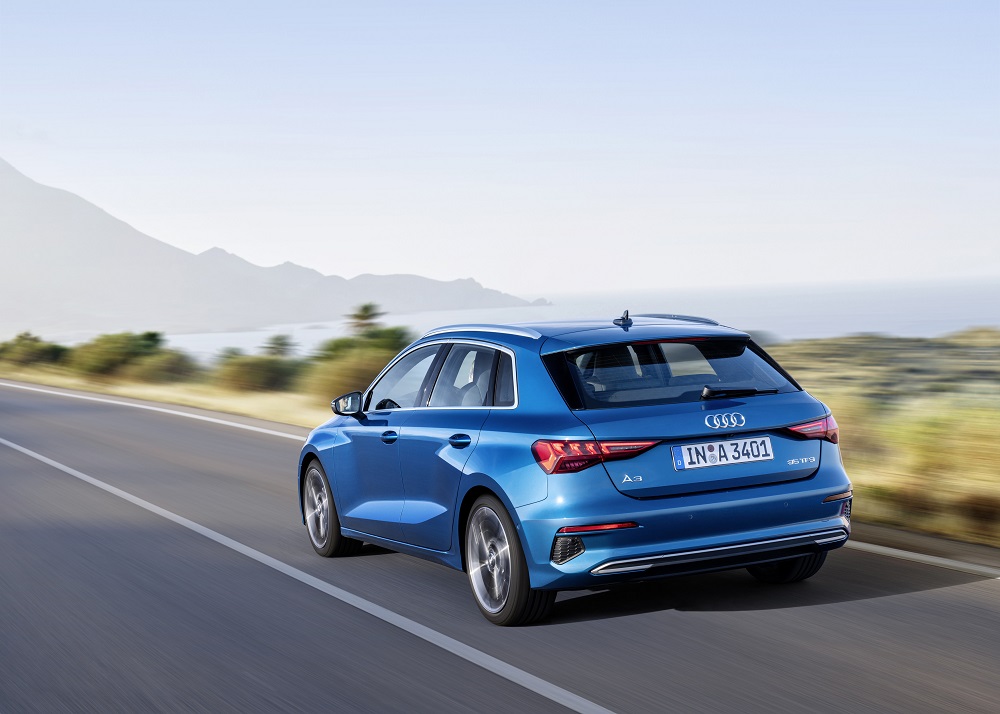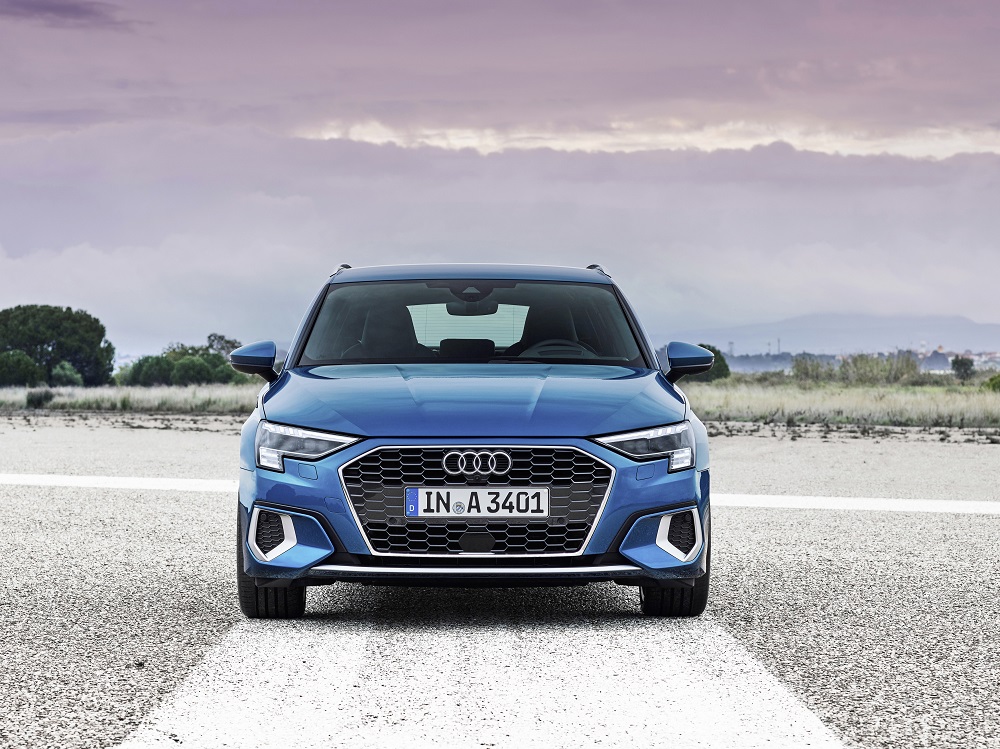Audi first established the premium compact class segment with the A3 in 1996. The fourth generation of the success model is now being introduced on the market – sporty, digitalized and fully connected.
Beneath the progressive design of the body of the new A3 Sportback lie many innovations from the full-size class, for example the infotainment, suspension, and driver assist systems.
Distinctive: design and lighting
The new Audi A3 Sportback features compact proportions and a sporty design. The wide Singleframe and large air inlets at the front end accentuate the dynamic character of the premium compact car.
The shoulder of the body extends in a smooth line from the headlights to the rear lights. The surface below is curved inward – a new element of Audi’s design that puts a stronger emphasis on the wheel arches.
The digital daytime running lights of the Matrix LED headlights are a further innovation. They consist of a pixel array made up of LED segments in a three by five arrangement that create special light signatures and make the A3 immediately recognisable.
The sporty and sophisticated design is continued in the interior with the new shifter, aluminium or carbon inlays, striking door openers and an instrument panel with a black-panel look.
Seat upholstery made of recycled PET bottles and adorned with stylish contrasting stitching are being used for the first time.
Digitalized: controls and displays
The cockpit of the A3 Sportback is wholly focused on the driver. It uses familiar elements from the brand’s full-size models and is equipped with a 10.1-inch touch display as standard, which is integrated into the center of the instrument panel.
This recognizes letters entered by hand, provides acoustic feedback and can be controlled using natural language. The instrument cluster, which the driver operates via the multifunction steering wheel, is also digital as standard. The Audi virtual cockpit offers additional functions such as a large display of the navigation map.
The plus version measures 12.3 inches and offers three different views, including graphics with a sporty look. A head-up display that projects important information onto the windshield in color can be installed upon request.
Intensified: the infotainment
The MMI operating concept is powered by the new third generation modular infotainment platform.
Its computing power is 10 times higher than that of its predecessor, it performs all tasks relating to connectivity, including telephony and the Audi connect services with LTE Advanced speed, and also has an integrated Wi-Fi hotspot.
Individual settings can be stored in up to six user profiles – from climate control and the seat position to frequently selected navigation destinations and frequently used media.
The DAB+ digital radio is included as standard and the online or hybrid radio is available as an option. Route guidance is even easier and more flexible.
For example, the navigation offers predictions on the development of the traffic situation, high-resolution satellite images from Google Earth and detailed 3D models of many major European cities.
Audi connect enriches points of interest with photos, opening hours and user reviews. The connect services also include the car-to-X services.
They help with finding free parking spots on the roadside or allow the driver to surf the green wave by communicating with traffic lights.
The A3 Sportback is connected to the smartphone via the myAudi app, Apple CarPlay or Android Auto, as well as via the Audi phone box. The latter connects the device to the car antenna and charges it inductively.
The Audi connect key, which authorizes the customer to lock and unlock the car and start the engine via their Android smartphone, and Amazon Alexa will follow shortly after the market launch.
Sophisticated: the engines
The new Audi A3 Sportback is being launched in Europe with a choice of three engine versions – a 1.5 TFSI with 110 kW (150 PS) (combined fuel consumption in l/100 km: 5.1 – 4.8; combined CO2 emissions in g/km: 116 – 111) and a 2.0 TDI that delivers 85 kW (116 PS) (combined fuel consumption in l/100 km: 3.6 – 3.5; combined CO2 emissions in g/km: 96 – 92) or 110 kW (150 PS) (combined fuel consumption in l/100 km: 3.9 – 3.7; combined CO2 emissions in g/km: 103 – 98).
All engines impress with their powerful torque and sophisticated running characteristics. The engine versions at start of production will be combined with front-wheel drive.
Power will be transmitted by a six-speed manual transmission or the quick-shifting seven-speed S tronic, the selector lever of which is now designed as a compact shifter.
The driver can push and pull this to control the basic functions of the automatic transmission. Shortly after market launch, Audi will be gradually expanding the offer to include further engine versions, including electrified drive systems and versions with quattro drive.
Refined: the suspension
The suspension of the new A3 Sportback – with a four-link rear axle for engines from 110 kW (150 PS) – is sporty and balanced, combining pleasant ride comfort with good dynamics. Upon request, the suspension is available with adaptive damper control, which simultaneously lowers the body by 10 millimeters.
Each damper permanently adapts to the road condition, the driving situation and the settings in the Audi drive select dynamic handling system, creating a wide spread between highly comfortable roll motion and agile handling.
With the sport suspension – standard in conjunction with the S line exterior, otherwise an option – the focus is clearly on the latter. Due to the tauter tuning of the suspension and dampers and the fact that the vehicle is lowered by 15 millimeters (0.6 in), the compact model conveys an even more direct contact with the road surface.
Well versed: the driver assist systems
Equipped with Audi pre sense front, swerve assist and lane departure warning, the A3 Sportback helps prevent accidents with other road users and offers a high level of safety as standard.
Further assist systems, such as the lane change and exit warnings as well as the cross-traffic and park assist systems, are available as an option. The adaptive cruise assist, which customers know from many of the full-size models, assists with longitudinal and lateral guidance.
It maintains the speed and distance to the vehicle in front and assists with lane guidance by means of gentle interventions in the electromechanical steering. This increases the level of driving comfort during long journeys in particular.









